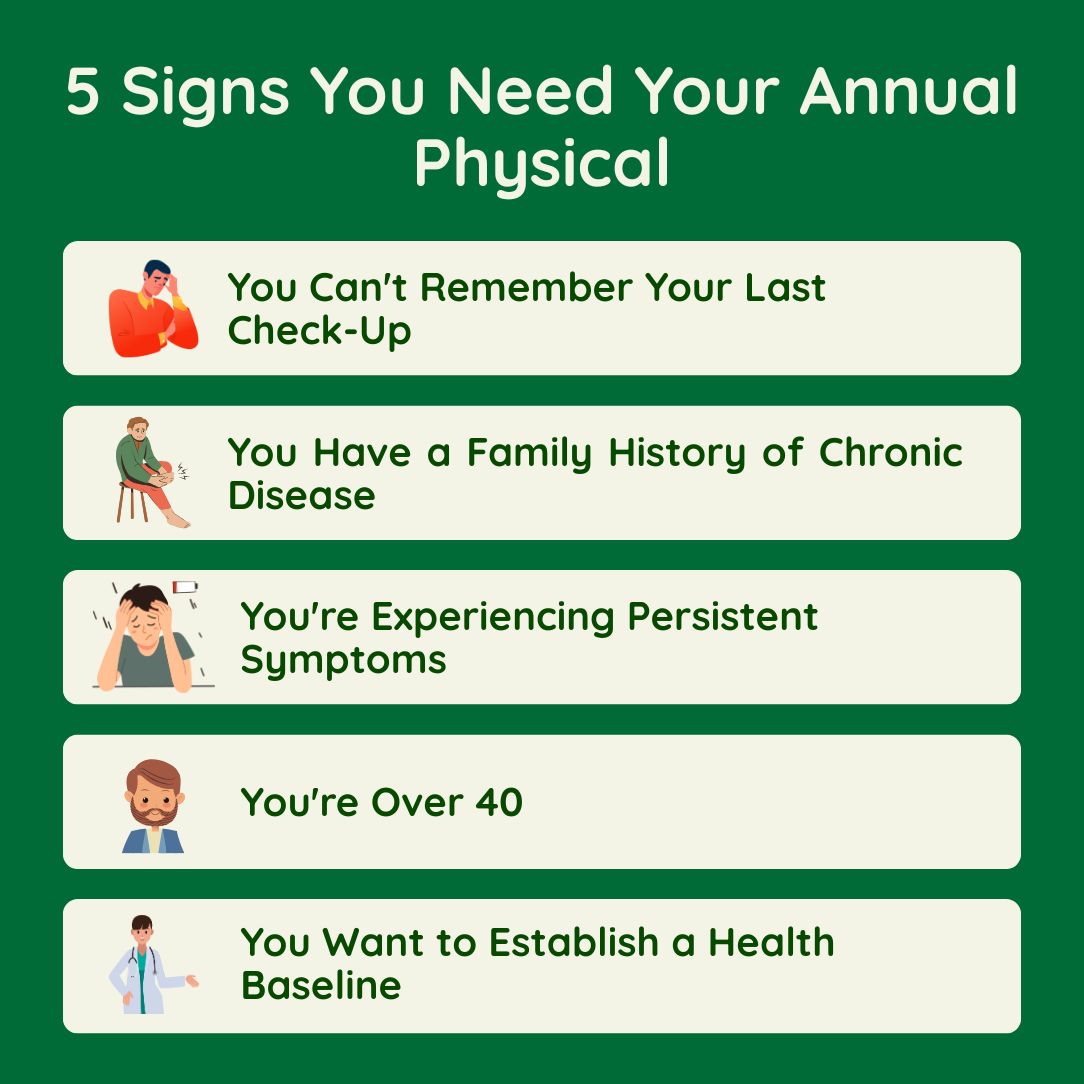Key Takeaways
- An annual physical exam is a cornerstone of preventive healthcare, allowing your doctor to catch potential issues early, when they are most treatable.
- Key signs that you're due for a physical include not remembering your last one, having a family history of chronic disease, or experiencing persistent, unexplained symptoms like fatigue or digestive issues.
- Your annual exam is the perfect time to review your overall health, discuss lifestyle goals, update vaccinations, and build a trusted relationship with your primary care provider.
In the hustle and bustle of daily life, it's easy to let your own health take a backseat. You might think, "I feel fine, so why do I need to see a doctor?" But waiting until something is wrong is a reactive approach to your health. An annual physical exam is one of the most proactive and powerful steps you can take to ensure your long-term well-being.
At SOM Medical Practice, we view your annual physical as a vital opportunity to partner with you in your health journey. It's about more than just checking boxes; it's about prevention, early detection, and creating a personalized plan to keep you healthy. Here are five signs that it's time to schedule your next appointment.
1. You Can't Remember Your Last Check-Up
If you have to rack your brain to remember the last time you saw a doctor for a routine check-up, you're likely overdue. An annual physical exam serves as a regular touchpoint to assess your overall health and establish a baseline. As the Cleveland Clinic notes, the purpose of this exam is to check your general health, make recommendations for a healthy lifestyle, and screen for underlying conditions you may not even be aware of [1].
2. You Have a Family History of Chronic Disease
Your family's health history can provide important clues about your own risk for certain conditions. If your parents, siblings, or other close relatives have a history of heart disease, diabetes, or certain types of cancer, it's especially important to have regular check-ups. Early and consistent screening can help catch these conditions at their most treatable stages, or even prevent them from developing in the first place.
3. You're Experiencing Vague but Persistent Symptoms
- Are you constantly tired, even after a full night's sleep?
- Have you been dealing with nagging digestive issues or unexplained aches and pains?
These kinds of persistent, non-specific symptoms are easy to dismiss, but they can be your body's way of telling you something is wrong. According to Hackensack Meridian Health, symptoms that persist and don't seem to be improving warrant a visit to your doctor [2]. Your annual physical is the perfect time to discuss these concerns and investigate potential underlying causes.
4. You're Over 40
While preventive care is important at every age, your 40s mark a significant milestone. This is the decade when the risk for many chronic conditions, including heart disease and Type 2 diabetes, begins to increase.
Regular screenings for blood pressure, cholesterol, and blood sugar become even more critical. Your doctor can help you understand your personal risk factors and create a strategy to stay healthy as you age.
5. You Want to Establish a Health Baseline and a Doctor-Patient Relationship
Seeing the same primary care provider every year allows you to build a trusted relationship with someone who understands your health history and your personal goals. This continuity of care is invaluable. Your doctor can track your health metrics over time, notice subtle changes that might otherwise be missed, and provide personalized advice that is tailored to you.

What to Expect During Your Annual Physical
If it's been a while, you might be wondering what a physical exam entails. The process is straightforward and typically takes about 30 minutes [1]. It generally includes:
- Health History Review: You'll discuss your personal and family medical history, lifestyle habits (like diet and exercise), and any concerns you may have.
- Vital Signs Check: A nurse or medical assistant will check your blood pressure, heart rate, respiratory rate, and temperature.
- Physical Examination: Your doctor will perform a head-to-toe examination, which includes listening to your heart and lungs, checking your abdomen, and examining your skin, among other things.
- Discussion and Planning: You and your doctor will discuss your health status, set goals for the coming year, and determine if any vaccinations or additional screenings are needed.
Your annual physical is a dedicated time for you to ask questions and get expert guidance on your health. Don't put it off any longer. Take a proactive step for your well-being and schedule your appointment with a SOM Medical Practice provider today. We have convenient locations throughout Western New York to serve you.
References
[1] Cleveland Clinic. (2025). Physical Examination: What Is a Physical Exam?. https://my.clevelandclinic.org/health/diagnostics/17366-physical-examination
[2] Hackensack Meridian Health. (2023). 7 Signs It’s Time to See a Doctor. https://www.hackensackmeridianhealth.org/en/healthu/2023/08/30/7-signs-you-need-to-go-see-your-doctor








